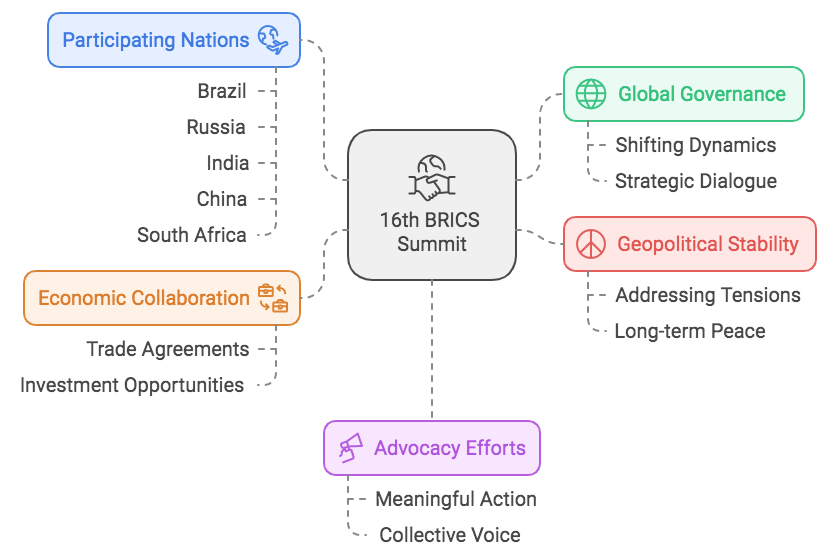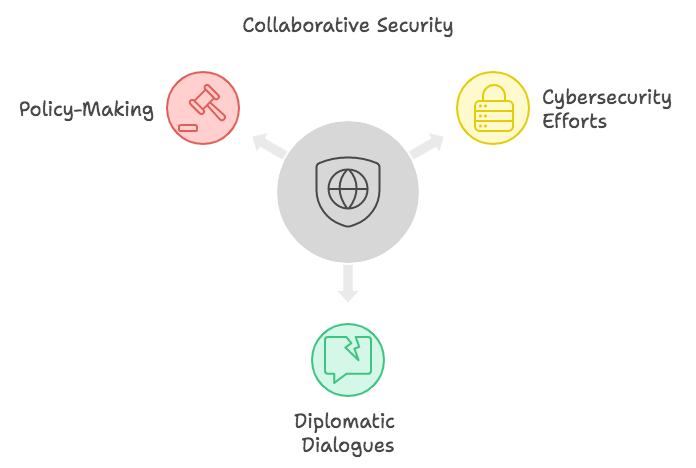“GLOBAL GOVERNANCE AND ADVOCACY COMPASS – A HANDBOOK FOR 2024″ | Advocacy Unified Network
The 16th BRICS Summit, held in Russia, is an event of significant global importance, bringing together five major emerging economies—Brazil, Russia, India, China, and South Africa. With the shifting dynamics of global governance and increasing geopolitical tensions, this summit comes at a time when cooperation and strategic dialogue are essential. Advocacy efforts play a critical role in shaping the outcomes of such meetings, particularly when it comes to addressing key issues such as geopolitical stability and economic collaboration among these influential nations.
As outlined in Chapter XXV of the GLOBAL GOVERNANCE AND ADVOCACY COMPASS (page 121), the summit provides a platform for advocates to push for meaningful action. In this context, the focus is not only on addressing immediate concerns but also on laying the foundation for long-term cooperation that can strengthen the collective voice of BRICS nations on the global stage.

Geopolitical Stability: The Cornerstone of Cooperation
One of the primary focuses of advocacy at the BRICS Summit is the promotion of geopolitical stability. Each of the five member nations plays a crucial role in maintaining peace and security, both regionally and globally. For BRICS to remain a powerful force in global governance, advocates must push for mechanisms that ensure stability among its members and in their respective regions.
Why Geopolitical Stability Matters
In an increasingly multipolar world, the global political landscape is marked by rising tensions and conflicts in several regions. BRICS nations, spread across diverse geopolitical landscapes, have their unique challenges but share a common goal of maintaining stability. Advocates must stress the need for proactive diplomatic engagement to prevent conflicts from escalating. This includes fostering dialogue between countries to resolve disputes and promoting peacekeeping initiatives where necessary.
For instance, Russia’s pivotal role in Eurasian security, China’s influence in the Asia-Pacific, and India’s leadership in South Asia are key to ensuring regional stability. Similarly, Brazil and South Africa have roles in stabilizing Latin America and Africa, respectively. Advocacy efforts at the summit should focus on enhancing BRICS’ collective influence by reinforcing diplomatic channels between these regions.
Advocates should also highlight the significance of promoting non-interference in the internal affairs of member nations, while at the same time, encouraging cooperation on issues that have cross-border implications, such as terrorism, cyber security, and organized crime. By doing so, BRICS can offer a model of geopolitical cooperation that balances respect for national sovereignty with the need for regional and global stability.
Advocacy Strategies for Peace and Security
The summit presents an opportunity for advocates to push for stronger security cooperation frameworks within BRICS. Peacekeeping initiatives, conflict resolution mechanisms, and efforts to promote mutual trust must be at the core of these discussions. Advocates should call for the creation of a formal BRICS conflict-resolution body or think tank that focuses on mediating disputes among member states and their neighbors.
Moreover, advocating for increased collaboration on cybersecurity and counterterrorism efforts is crucial. As threats in these areas grow more sophisticated, BRICS nations have the capacity to lead by example in creating comprehensive, cooperative security strategies that protect not only their citizens but also enhance global security.
At the summit, advocates should also push for more formalized diplomatic dialogues that include not only heads of state but also experts in international relations, peacebuilding, and security. This can lead to more nuanced and effective policy-making, with advocacy playing a key role in ensuring these discussions translate into action.

Economic Collaboration: Harnessing BRICS’ Collective Potential
The Power of Unity
While geopolitical stability is crucial, the economic collaboration among BRICS nations is equally important. With a combined economic strength that accounts for nearly a quarter of the global GDP and a significant portion of the world’s population, BRICS is uniquely positioned to challenge the prevailing dominance of traditional Western-led economic institutions. This collective power presents a compelling opportunity for member nations to redefine global economic dynamics, advocating for a more equitable distribution of resources and influence.
A Counterbalance to Traditional Institutions
In a world where institutions like the International Monetary Fund (IMF) and the World Bank have long dictated the terms of economic engagement, BRICS has the potential to act as a counterbalance, providing an alternative model for global cooperation. Advocates at the summit should emphasize that the strength of BRICS lies not just in its economic heft but also in its diversity. Each member nation brings unique strengths and resources to the table, from Brazil’s agricultural exports and South Africa’s mining sector to China’s manufacturing capabilities and India’s growing tech industry.
This diversity allows BRICS to forge a more inclusive approach to economic governance, where the voices of emerging economies are not just heard but also prioritized. By positioning itself as a formidable economic bloc, BRICS can advocate for policies that reflect the interests of developing countries, ensuring that economic growth is not a privilege of the few but a shared benefit for all.
Addressing Disparities Within the Group
One of the most pressing challenges facing BRICS is the disparities that exist between its member nations. While some, like China and India, have experienced rapid economic growth, others, such as South Africa and Brazil, face economic hurdles that hinder their development. Advocates at the summit should highlight how economic cooperation can help bridge these gaps and promote shared prosperity among BRICS countries.
The potential for joint investments in infrastructure, technology transfer, and collaborative research initiatives can create synergies that benefit all members. For example, India’s expertise in information technology can be leveraged to enhance Brazil’s digital economy, while South Africa’s vast natural resources can provide energy security for China’s expanding industries. Such partnerships not only foster economic growth but also contribute to a more cohesive BRICS identity, where every nation feels invested in the collective success of the bloc.
Fostering Sustainable Development
In advocating for economic collaboration, it is essential to underscore the importance of sustainable development. As global concerns around climate change and environmental degradation mount, BRICS nations have a responsibility to lead by example in promoting sustainable economic practices. Advocates should push for initiatives that align economic growth with environmental stewardship, ensuring that the pursuit of prosperity does not come at the expense of future generations.
Collaborative efforts in renewable energy projects, sustainable agriculture, and green technology can position BRICS as a leader in the global shift toward a more sustainable economy. By sharing knowledge and resources in these areas, member nations can create a framework for economic growth that is both inclusive and environmentally responsible.
The Role of Business and Innovation
To realize the full potential of economic collaboration, engaging the private sector is crucial. Business leaders from BRICS countries must be brought into the conversation, as their insights and innovations are key to driving economic growth. Advocates at the summit should promote platforms for dialogue between governments and businesses, fostering public-private partnerships that leverage resources and expertise from both sectors.
Innovation plays a pivotal role in this dynamic, as BRICS nations collectively invest in research and development initiatives that address common challenges. From enhancing agricultural productivity to advancing technological solutions in healthcare, collaboration among businesses can yield significant benefits for all member nations.
A Unified Economic Strategy
The path toward effective economic collaboration among BRICS nations requires a shared vision and commitment to collective action. Advocates must work diligently to outline a unified economic strategy that prioritizes cooperation, inclusivity, and sustainability. By fostering strong partnerships and aligning interests, BRICS can pave the way for a new era of economic engagement that not only enhances the prosperity of its member nations but also sets a precedent for other emerging economies around the world.
The economic collaboration among BRICS nations holds immense potential to address disparities, promote shared prosperity, and challenge traditional economic paradigms. As advocates gather at the 16th BRICS Summit, their focus on harnessing this collective potential will be vital in shaping a more equitable and sustainable global economic landscape.
The Case for Economic Integration
BRICS nations represent about 40% of the global population and nearly a quarter of the global GDP. Despite this, economic inequalities and development gaps exist both within and between these nations. Advocates must emphasize the need for mechanisms that reduce these disparities, particularly by fostering more inclusive investment frameworks. For example, Russia, China, and India possess significant capital, while Brazil and South Africa bring substantial natural resources and emerging markets. By collaborating more closely, BRICS nations can unlock synergies that benefit all members.
Advocates should focus on promoting investments in infrastructure, technology, and energy as areas of mutual benefit. Highlighting the importance of sustainable development, particularly as it relates to renewable energy projects and environmentally responsible industrialization, can garner support for economic policies that benefit all BRICS nations.
Engaging Business and Economic Leaders
One of the key strategies for effective advocacy at the BRICS Summit is engaging with business leaders and economic experts. Advocates should push for more direct dialogue between governments and private sector leaders, emphasizing how businesses can contribute to sustainable economic growth. Business leaders play an important role in bridging gaps between policy and implementation, and their insights into market trends, investment risks, and opportunities can provide valuable context to advocacy efforts.
Advocates should also promote the idea of public-private partnerships (PPPs) within BRICS to support major infrastructure projects. By doing so, the advocacy efforts can drive the creation of jobs, boost cross-border trade, and improve living standards within BRICS nations.
Economic Diplomacy: Strengthening Trade Ties
Economic cooperation is not limited to large infrastructure projects or investment policies. Trade diplomacy is a key aspect of advocacy at the BRICS Summit. Advocates should push for agreements that lower trade barriers, reduce tariffs, and simplify regulatory processes between BRICS nations. By strengthening trade ties, these nations can create a more integrated economic bloc that holds greater influence in global trade negotiations.
Advocates can also focus on specific sectors where BRICS nations have complementary strengths, such as technology, agriculture, and manufacturing. By promoting collaboration in these areas, the BRICS group can drive innovation and shared growth, making the bloc more resilient in the face of global economic uncertainties.
The Future of BRICS Cooperation
The 16th BRICS Summit in Russia represents a critical moment for advocates who are dedicated to promoting geopolitical stability and economic collaboration. With the world facing increasing uncertainties, the summit is an opportunity for BRICS to strengthen its role in global governance. By advocating for practical solutions that enhance stability, foster dialogue, and drive economic growth, BRICS nations can collectively shape a more stable and prosperous future.
As detailed in Chapter XXV of the GLOBAL GOVERNANCE AND ADVOCACY COMPASS (page 121), advocacy at this summit is not merely about addressing immediate concerns but about crafting a long-term vision for BRICS cooperation. The Advocacy Unified Network continues to play a key role in these discussions, providing a roadmap for how BRICS nations can work together to address both current and future challenges.
Through coordinated advocacy efforts, the summit’s outcomes could have a lasting impact on how BRICS nations approach global governance, ensuring that their voices are heard in the shaping of a more balanced and equitable international order.

